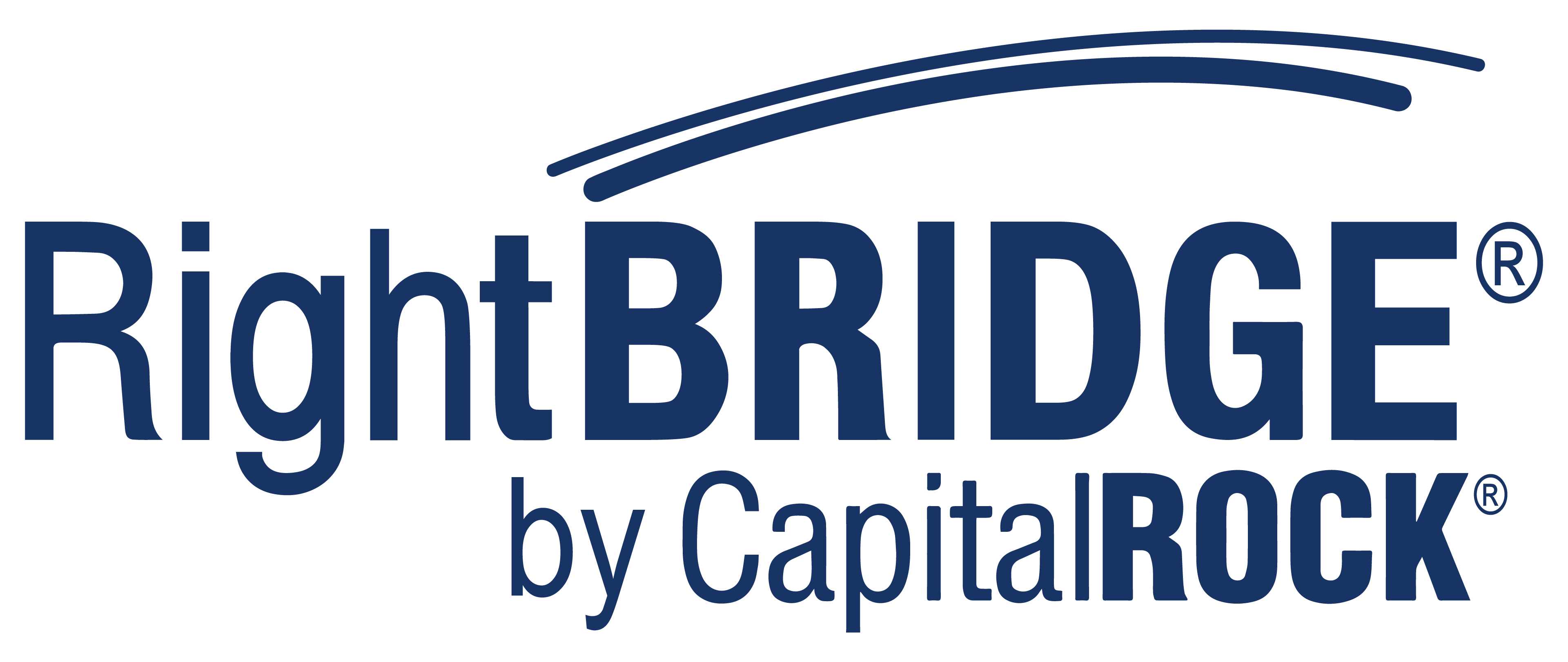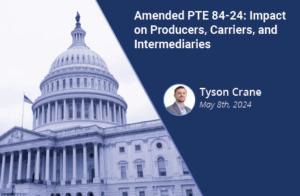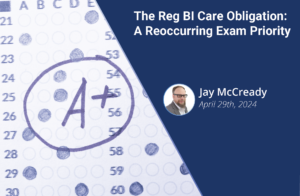January 22nd, 2024 | Tyson Crane, VP of Product Maangement, CapitalROCK
For most people in 2023, Halloween was a holiday where they enjoyed festivities such as handing out candy and carving pumpkins. However, for financial services professionals, it was a highly anticipated announcement of another proposed fiduciary rule by the Department of Labor (DOL). President Biden delivered a speech from The White House unveiling the proposed new rule. The DOL proposed “Retirement Security Rule” and its amendments, span over 500 pages, and encompasses regulatory guidance and exemptions, with one of the most substantial changes focusing on the existing Prohibited Transaction Exemption 84-24. This article will highlight some of the most notable changes in the proposed PTE 84-24 amendment.
What is a Prohibited Transaction Exemption?
The DOL is responsible for the oversight and enforcement of plans that fall under the Employee Retirement Income Security Act (ERISA). Examples of ERISA plans include but are not limited to defined benefit plans and defined contribution plans such as 401(k)s, 403(b) plans, etc. Under ERISA, transactions or rollovers involving ERISA plans are considered to be fiduciary advice. Therefore, to avoid conflicts of interest, a financial representative is not allowed to collect compensation. Over time, processes were created that permit an exemption so that an individual can still be compensated. Those defined processes are called Prohibited Transaction Eor xemptions (PTE). Historically, there have been many different PTEs available for different types of transactions. PTE 84-24 specifically addresses transactions involving insurance commissions related to the sale of insurance or annuity contracts.
Proposed Amendments to PTE 84-24
Who can use it?
PTE 84-24 has previously been defined as an available exemption for transactions involving insurance or annuity contracts. That includes whether a plan or IRA is purchasing an annuity contract or investment company securities or if an insurance agent, broker or pension consultant used funds from a plan or IRA to fund an annuity purchase.[1] (PAGE 4 of PTE 84-24 Amendment)
The proposed rule would only allow independent insurance agents (called Independent Producers) who can sell the products of at least 2 insurance companies to use PTE 84-24.
Other insurance agents are considered ‘carrier agents’ or ‘captive agents’ and would need to rely on PTE 2020-02. Under PTE 2020-02, the insurance company or broker dealer is considered a co-fiduciary alongside the insurance agent. Under 84-24 the insurance carrier would be required to provide meaningful supervision over the independent producer making the recommendation and sale to the retirement investor .[1] (PAGE 17 of 84-24)
It is also worth noting that independent producers who could use PTE 84-24 would be selling non-registered annuities. Examples of registered annuities include variable annuities and registered-indexed linked annuities (RILA). Non-registered annuities include fixed annuities, fixed indexed annuities, single premium immediate annuities and deferred income annuities. In order to sell a registered annuity, an individual must become licensed and associated with a broker dealer. Based on the new proposal, that individual would need to use PTE 2020-02 and would not qualify the criteria for PTE 84-24.
Impartial Conduct Standards
Independent producers would now be considered fiduciaries since the proposed rule would make even a one-time transaction or rollover involving an ERISA plan investment advice. If PTE 84-24 is leveraged, the producers are held to a higher standard and must abide by the defined impartial conduct standards. Impartial Conduct Standards[1] (pg 19 of amendment)
-
- Act in the Retirement Investor’s Best Interest
- Receive no more than reasonable compensation
- Make no misleading statements
Best Interest
Similar to PTE 2020-02, under PTE 84-24 independent producers would be required to make sure that their advice reflects the best interest of the retirement investor. The proposed amendment defines best interest advice as “advice [that] reflects the care, skill, prudence, and diligence under the circumstances then prevailing that a prudent person acting in a like capacity and familiar with such matters would use in the conduct of an enterprise of a like character and with like aims, based on investment objectives, risk tolerance, financial circumstances and needs of the Retirement Investor, and does not place the financial or other interests of the Independent Producer, Insurer or any Affiliate, Related Entity, or other party ahead of the interests of the Retirement Investor.”[1] (page 19 of amendment)
Reasonable Compensation
Like PTE 2020-02, the proposed exemption would require an independent producer and insurance carriers to ensure that compensation does not exceed reasonable compensation.
The proposed PTE 84-24 specifically defines a new term “insurance sales commission” as “sales commission paid by the Insurance Company or Affiliate to the Independent Producer for the purchase or sale of an insurance or annuity contract, including renewal fees and trailing fees, but excluding revenue sharing payments, administrative fees or marketing payments, payments from parties other than the Insurance Company or its Affiliates, or any other similar fees.”[1] (page 91 of the amendment)
The new definition creates a distinction between PTE 2020-02 and PTE 84-24 where compensation for an independent producer must only include commission, renewal fees and trailing fees. Anything outside of that appears to be outside the scope of the allowed compensation.
This newly defined term could have a big impact on how compensation works today for insurance carriers and independent producers in the insurance industry. Non-cash incentives such as trips, vacations, or even quota-based education conferences would no longer be allowed. The approach of the DOL is that these incentives create a conflict of interest.
It is anticipated there will be questions raised during the comment period of the proposed rule around the definition of ‘reasonable’. The proposed rule does not make it clear what criteria insurance carriers can use to support their decision of reasonable compensation. There are also other factors carriers must consider such as anti-trust laws that would limit their ability to coordinate or collect data to support their reasoning for a compensation range.
No Misleading Statements
As part of the impartial conduct standard, independent producers would need to ensure that none of the producer’s statements or materials provided to the retirement investor include materially misleading statements. The proposed rule goes out of its way to also note that it includes omitting information that is considered relevant in the light of the circumstances under which the statement was made.
In summary, the independent producer will face a large administrative responsibility to approach and document the annuity transaction in much more detail than they may have previously been required to do.
Disclosures
The proposed PTE 84-24 introduces a disclosure requirement like PTE 2020-02 where an independent producer would now need to provide disclosures to the retirement investor before engaging in a transaction. The most notable difference though is that only the independent producer would be required to acknowledge their fiduciary status. The insurance carrier would not be under the same obligation.
Transaction Disclosures
In addition to fiduciary status, the independent producer would be required to provide a written description of their services and material conflicts of interest. It must also include the products that the independent producer is licensed and authorized to sell, including any limits on the range of insurance products recommended.
The proposed amendment also lists specific insurance carriers and specific investment products available for recommendation must be included.
One clear distinction between PTE 2020-02 and the proposed PTE 84-24 is that “the sales commission must be disclosed in both dollars and as a percentage of gross annual premium payments. If applicable, the statement must also disclose the amount the Independent Producer will be paid for the first year and each succeeding year.”[1] The difference here to highlight is the requirement to list the commission in a dollar amount.[2]
Best Interest Documentation and Rollover Disclosures
The independent producer would now be expected to provide documentation on the considerations and conclusions around why the non-security annuity is in the best interest of the retirement investor. The documentation must be provided to both the investor and the insurance carrier.
If the transaction includes a rollover, the independent producer must consider and document how they concluded that it is in the retirement investor’s best interest. The DOL will expect important factors to be considered such as the alternatives to the rollover, comparison of fees and expenses between the plan and the proposed product, whether an employer or other party pays for some or all administrative expenses and the different levels of fiduciary protection, services and investments available. [1] (pg 25 of amendment)
Plans provide a form called Form 404(a)(5) to the retirement investor that contains most of the relevant information. However, based on the experience of individuals and firms since the update of PTE 2020-02 in 2021, investors typically are either unaware of the form or do not know how to conveniently access the form. This scenario creates a challenge for the independent producer as they will now be responsible for having the plan information as part of their analysis.
Impact on Insurance Carriers
As mentioned, the proposed PTE 84-24 amendment makes it clear that the insurance carrier will not hold the same co-fiduciary responsibility that institutions have under PTE 2020-02. However, it does make clear that additional suitability responsibilities will be expected in the form of policies and procedures. The exemption as a whole “depends on oversight by a responsible Insurer to ensure that appropriate policies and procedures are in place.”[1] (pg 26 of amendment)
The DOL acknowledges in the amendment that insurance carriers are regulated at the state level and that many have implemented procedures to support best interest practices based on the NAIC Model Regulation. With that said, the DOL notes that in addition to state-law suitability requirements, the carrier would be expected to review transactions based on the requirements of PTE 84-24 such as the impartial conduct standards, disclosures and documentation.[1]
The DOL does confirm in the proposed amendment that insurance carriers would only be required to supervise an independent producer’s recommendations based on the annuities they offer and not based on the universe of annuities.
Another concept introduced by the proposed PTE 84-24 is the retrospective review requirement. The DOL would require that insurance carriers conduct a retrospective review at least annually. The review must be reasonably designed to detect and prevent violations of the impartial conduct standards and review the effectiveness of the supervision system. It appears the concept of the retrospective review was mostly borrowed from PTE 2020-02, however, under PTE 84-24 insurance carriers would be required to review whether to continue to allow individuals to sell their annuity contracts to retirement investors.
A senior executive officer of the insurance carrier will have to certify the retrospective report annually.
Wrapping it up
In short, if the DOL’s rule and amendments are adopted in a form close to their proposed state, the regulatory landscape is only going to become even more difficult to navigate. Individuals and financial services entities are going to have to consider each transaction and what process it must follow to be compliant with a large list of regulations such as the SEC’s Regulation Best Interest, state level best interest requirements, and the DOL’s Retirement Security Rule. Regulators will expect individuals and firms to be compliant with their requirements and that there is a consistent and repeatable process to account for the policies and procedures.
Resources:
[1]https://www.dol.gov/sites/dolgov/files/ebsa/temporary-postings/proposed-amendment-to-pte-84-24.pdf
The material contained in this communication is informational and general in nature. The material contained in this communication should not be relied upon or used without consulting appropriate legal or financial representatives to consider your specific circumstances. This communication was published on the date specified and may not include any changes in the topics, laws, rules, or regulations covered.






